Best Antioxidants For Hikers:
Pack Some To Stay Strong
By Diane Spicer
The best antioxidants for hikers are coming right up, after this:
DISCLAIMER
The information for hikers on this website is not medical advice.
Always consult your medical care providers. They can answer your questions and advise you about interactions between antioxidants and your medications or conditions.
Okay, let's try this again.
The best antioxidants for hikers are...
Wait another minute.
Let's back up.
Maybe the whole topic of eating for strength on the trail is new to you.
So let's start off with the obvious questions.
If you want the recommendations, skip down here.
What are antioxidants,
and why do I, an intrepid hiker, care?
Excellent questions!
Here is a quick, two part answer:
Antioxidant introduction
Not to be a smarty pants or anything, but an antioxidant is a molecule that's anti oxidation.
- Which is a circuitous explanation that only a biochemist could love.
Let's try again.
Think of an antioxidant as a warrior molecule, built to protect your cells against exposure to high energy particles that may damage critical structures and functions.
- If you've heard of free radical, that's the high energy, unpredictable and unstable enemy.
- Going with the warrior analogy, they would be bullets piercing your cell membranes or damaging internal structures.
An antioxidant can inhibit free radical formation during the process of oxidation. In other words, take away the bullets.
- And thus, delay or prevent cellular damage.
- And also protect your body against inflammation.
Sounds like a full time job, right?
Why hikers need antioxidants
I don't know about you, but when I'm pulling a long hill with a heavy-ish backpack, I go into open mouth breathing so I can gulp down oxygen molecules.
These little atomic packages get delivered to my skeletal muscles, heart, and brain to keep me upright and mobile.
But they also can generate those unhelpful high energy molecules known as the "I don't wanna play by the rules" gang.
- Oxidative stress, in other words
So let's agree that hikers need antioxidants because we all engage in vigorous, strenuous, continuous muscle contractions.
Inevitably, this leads to free radical generation in our tissues.
And sometimes, we keep ourselves in oxidative stress, day after day after day, on a hiking trek.
- Consider antioxidants as a cheap, effective cellular insurance policy.
More sources of cellular harm on the trail
Hikers also put themselves in the way of free radicals generated by these trail activities:
- relentless exposure to the ultraviolet rays of the sun
- chemicals and preservatives in food
- environmental toxins in air, soil and water such as pesticides along the trail
Why hikers aren't
getting enough antioxidants
Fresh fruits and vegetables are sources of the best antioxidants for hikers.
But you already know where this leads.
Hikers cannot lug heavy acorn squashes, crates of richly colored but fragile berries or tomatoes, or bottles of red wine down the trail.
- Well, we can! But most of us choose not to ;)
Which leads us into the next logical question...
What are the
best antioxidants for hikers?
There are two ways to call out the names of the best antioxidants to pack along on your next hiking trip:
- vitamins
- biochemical names
Vitamins first...
The alphabetical vitamins
Vitamins A, C and E are pertinent to this discussion of best antioxidants for hikers.
Eating foods containing them will help you recover from oxidative stresses.
- Tips on what to eat while hiking can be found below.
These three vitamins are readily available in supplemental forms, and if you're going fast, light and hard over a number of days on the trail, please consider whether you should include them.
- These dietary supplements fact sheets can help you make that decision.
For a thorough look at water soluble vitamin C sources for hikers, read this.
For a quick way to get your vitamin C and antioxidants as a hiker, use Emergen-C in your water bottle. The flavor might entice you to drink more often, a hydration bonus.
NOTE: Vitamins A and E are fat soluble, meaning they can build up in your adipose stores if you're mega-dosing.
- Regular, small doses make sense on the trail.
- On the other hand, you're hiking with some stored A and E from your previous meals - for awhile, that is.
More good Vitamin A news for hikers
This vitamin strengthens your vision, one of the first senses to be compromised at dusk and dawn on a trail.
- Which helps you differentiate between a tree stump and a bear!
Dusk and dawn are the times many large mammals are most active, so it pays to be able to differentiate a shadow from something that could eat you.
Vitamin E bonus round
Vitamin E is a powerful weapon against the day to day accumulation of inflammation in your hiking body.
Vitamin E trail tip:
If you have Vitamin E capsules handy, pop them open (using clean hands) and rub the oil into insect bites, burns or abrasions to soothe and aid skin healing.
Now let's get molecular.
Gnarly molecular names
When looking for antioxidant names in foods and supplements, here's where to start:
- Beta-carotene
- Lutein
- Lycopene
- Selenium
To dive deeply into choosing the best antioxidants for hikers (and any other human on the planet), read this.
While we're on a roll, let's finish up with the last logical question on your mind.
What are smart trail choices
for the best antioxidants?
Space, weight, availability of water sources, and many other factors play into what you include or exclude in your hiking menus.
Luckily, there are some really sneaky, inexpensive and genius level ways to sneak the best antioxidants for hikers into your food repertoire.
Great all around source of antioxidants

Toss a spoonful of this antioxidant blend on breakfast grains and desserts.
- It helps provide a chewy, satisfying mouth feel.
- The high fiber will help you keep regular bowel habits on the trail.
Trail tip:
Be sure to drink a lot of water to get the full benefit of the fiber.
- Here are more reasons why hiking hydration should be a top priority for a hiker.
Cozy up with cranberries
Look forward to a handful of apple juice sweetened dried cranberries as a trail snack or oatmeal topping.
Clinical trials with cranberries have established a connection with reduced severity of urinary tract infections (UTIs).
- Female hikers know that diminished hygiene on the trail can set us up for one of those nasty UTI episodes.
Cranberry extracts are available in powder, capsule and tablet form, if space and weight are at a premium in your backpack.
Nuts and seeds to the rescue
One of the best hiking foods is also one of the most portable, affordable, tasty choices for the best antioxidants for hikers: nuts and seeds.
To make an antioxidant rich mouthful, choose almonds, hazelnuts, sunflower seeds, or peanuts.
- Read more about how to make the best Vitamin E rich choices for nuts and seeds here.
Get jerky-ish
As in beef, bison, turkey, venison, chicken and fish jerky.
- EPIC makes a clean, tasty source of these types of jerkies.
Something's fishy around here
Fish oil capsules are teeny tiny, nearly weightless, and chock full of vitamin A.
Trail tips:
Swallow 'em quick, to avoid a fishy taste.
And store them in a crushproof package, not a plastic bag.
- You don't want mammals to realize that something's fishy in your backpack.
More ways to stay strong
on the trail
Antioxidants are only one piece of your hiking nutrition puzzle.
Hikers also need plenty more information to stay strong on the trail:
- Best protein sources for hikers
- Carbohydrates for energy
- Assessing your hiking nutrients
- Eat your A-B-Cs
Eat smart, hike strong, and enjoy your trail time :)
Home page > Hiking Nutrition >
Best Antioxidants For Hikers
When you purchase through the links on this website, a small amount of money flows into the Hiking For Her coffers, allowing the best hiking tips to continue to flow freely.
Everything recommended or reviewed on this site is trail tested and considered worthy of your time and attention.
It costs you nothing extra.
And no free radicals are formed.
Thanks for your support!
|
I get emails all the time about what I wear, eat, carry and love to use on the trail. That's
why I provide affiliate links to you: the best gear that I use myself and have seen used by other hikers is instantly
available for your consideration, and the gear company sends a few
pennies per dollar to this reader-supported hiking website. There is no added cost to you! Everyone ends up a winner: Great gear for you, strong gear companies, and more free hiking tips for everyone. Thanks very much for your support. It's warmly and sincerely appreciated. It also helps send these hiking tips to all your virtual trail buddies around the globe. |
 |




